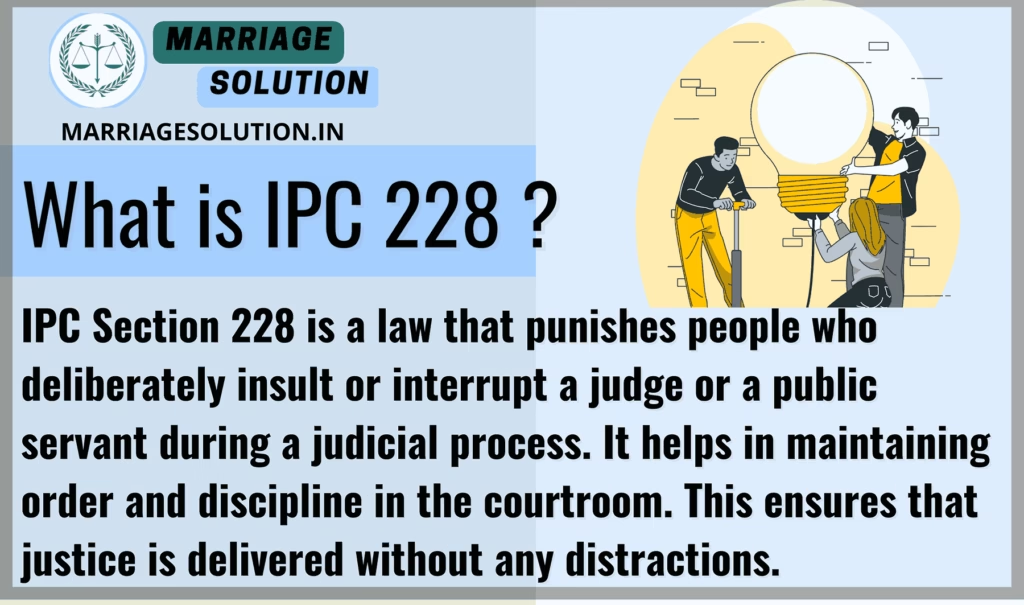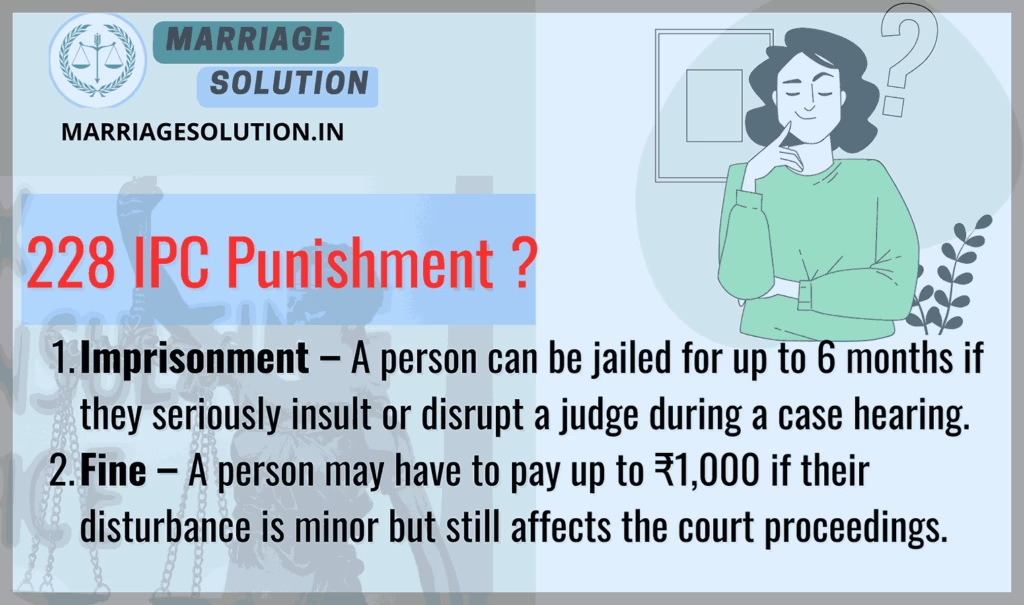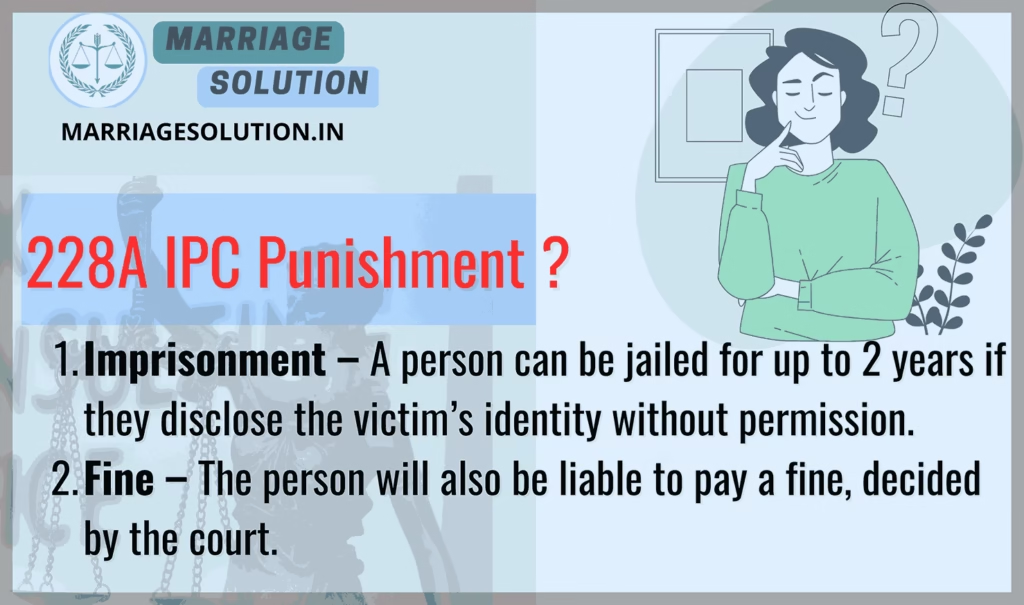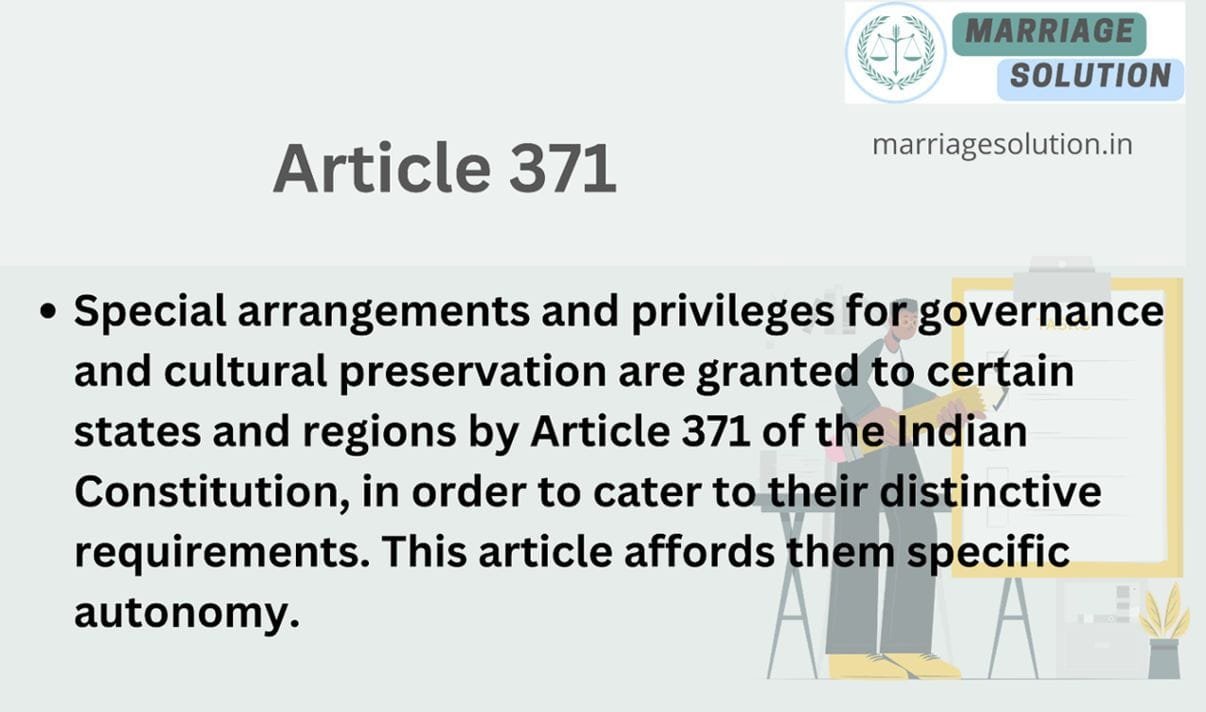Introduction of Section 228 of IPC
Section 228 of IPC punishes anyone who intentionally insults or disturbs a judge or a public servant during a court hearing. This law ensures that judicial officers can perform their duties without interference or disrespect. It protects the court’s dignity and authority, allowing legal proceedings to happen in a peaceful and fair manner.
- Introduction of Section 228 of IPC
- What is IPC Section 228 ?
- 228 IPC in Simple Points
- 228a IPC in Simple Points
- 1. Protecting the Identity of Rape Victims
- 2. Punishment for Violating the Law
- 3. Exceptions to the Rule
- 4. Publishing Court Proceedings Without Permission is Illegal
- 5. High Court and Supreme Court Judgments Can Be Published
- Example 1: A News Website Publishes the Name of a Rape Victim
- Example 2: A YouTuber Shares Personal Details of a Victim
- Section 228 IPC Overview
- 10 Key Points of IPC 228
- 1. Protecting the Respect of the Court
- 2. Covers Intentional Disrespect
- 3. Punishment for Violating IPC 228
- 4. Applies Only During Court Hearings
- 5. Who Can Be Insulted Under IPC 228?
- 6. Disturbing the Court’s Proceedings is a Crime
- 7. Difference Between IPC 228 and Contempt of Court
- 8. IPC 228 is a Non-Cognizable Offense
- 9. Bailable Offense – Accused Can Get Bail
- 10. Real-Life Situations Where IPC 228 is Applied
- Examples of IPC 228
- Section 228 IPC case laws
- 228 IPC Punishment
- 228a IPC Punishment
- 228 IPC Bailable or non bailable
- Section 228 IPC in short information
- IPC Section 228 FAQs
- If you need support with court proceedings or any other legal matters, don’t hesitate to reach out for assistance.
What is IPC Section 228 ?
IPC Section 228 is a law that punishes people who deliberately insult or interrupt a judge or a public servant during a judicial process. It helps in maintaining order and discipline in the courtroom. This ensures that justice is delivered without any distractions.

228 IPC in Simple Points
1. Courtroom Must Be Respected
The courtroom is a place of justice, and every person inside it must behave respectfully. Any insult, rude behavior, or intentional disturbance is not allowed. If someone disrespects the judge or disrupts the proceedings, they can be punished under IPC 228.
2. Only Applies to Judicial Proceedings
This law is only applicable during court hearings. If a person insults a judge outside the courtroom, it will not be covered under IPC 228. However, serious insults outside the court may be punished under Contempt of Court laws.
3. Punishment Under IPC 228
If a person is found guilty under IPC 228, they can face imprisonment of up to 6 months, or a fine up to ₹1,000, or both. The severity of the punishment depends on how serious the insult or disturbance was.
4. Bailable and Non-Cognizable Offense
IPC 228 is a bailable offense, meaning the accused can apply for bail. It is also non-cognizable, which means police cannot arrest the accused without court permission. This ensures that minor disturbances are not misused for wrongful arrests.
5. Ensures a Fair Judicial Process
By punishing disruptions and insults, IPC 228 helps judges focus on fair decision-making. If court hearings are disturbed, it affects justice delivery. This law ensures that everyone respects the legal system and allows cases to be heard without interference.
228a IPC in Simple Points
1. Protecting the Identity of Rape Victims
IPC 228A makes it illegal to publish the name, photograph, or any information that can reveal the identity of a rape victim. This law applies to newspapers, social media, websites, TV channels, and other forms of publication. The aim is to safeguard the dignity of the victim and prevent social discrimination.
2. Punishment for Violating the Law
If someone publishes or prints the identity of a rape victim, they can be jailed for up to 2 years and fined. The law ensures strict punishment to prevent media and individuals from revealing sensitive details that could harm the victim or their family.
3. Exceptions to the Rule
There are a few situations where revealing the victim’s identity is allowed:
- If the victim gives written permission to publish their identity.
- If the victim is dead, a minor, or mentally unstable, the next-of-kin can authorize the publication.
- If a police officer investigating the case publishes the name in good faith for investigation purposes.
- Courts and welfare organizations recognized by the government can also publish the name under special conditions.
4. Publishing Court Proceedings Without Permission is Illegal
If any person publishes details about court proceedings related to a rape case without prior approval from the court, they can also be punished under IPC 228A. This prevents misreporting and misuse of sensitive information.
5. High Court and Supreme Court Judgments Can Be Published
While the law prevents revealing the identity of victims, it does not prohibit publishing judgments made by the High Court or Supreme Court. This means that legal decisions and justice outcomes can be made public, but the victim’s identity must remain confidential.
Example 1: A News Website Publishes the Name of a Rape Victim
A news website mentions the name and address of a woman who filed a rape case. Since this reveals her identity, the editor and website owner are charged under IPC 228A and fined with imprisonment.
Example 2: A YouTuber Shares Personal Details of a Victim
A YouTuber posts a video discussing a rape case and reveals the victim’s social media profile. Since this can harm the victim’s privacy, the YouTuber is arrested and punished under IPC 228A.
Section 228 IPC Overview
10 Key Points of IPC 228
1. Protecting the Respect of the Court
The court is a place of law and justice, where important decisions are made. It must be treated with seriousness and respect. If people insult or disrupt the court, it affects the judge’s ability to make fair judgments. IPC 228 makes sure that the court’s authority is not undermined and that every case is heard in a proper legal environment.
2. Covers Intentional Disrespect
This law only applies when a person deliberately insults or interrupts a court proceeding. If someone accidentally says something offensive, it is not punishable under this section. For example, if a person angrily argues with a judge on purpose, it is considered an offense. However, if someone accidentally speaks out of turn, it does not fall under IPC 228.
3. Punishment for Violating IPC 228
If a person is found guilty under IPC 228, they can be fined up to ₹1,000 or jailed for up to six months, or both. The punishment depends on the seriousness of the insult or disturbance. A minor disturbance might only result in a warning or a fine, while a major insult or repeated behavior could lead to imprisonment.
4. Applies Only During Court Hearings
This law is only applicable inside a courtroom or during an official court hearing. If someone insults a judge outside the court, it does not fall under IPC 228. However, serious insults outside the court may still be punished under contempt of court laws. This section ensures that all court proceedings happen in an orderly manner without unnecessary interference.
5. Who Can Be Insulted Under IPC 228?
This law protects judges, magistrates, and other public servants working in a judicial role. The insult or disturbance must be directed at them while they are performing their duties. For example, if a person shouts at a magistrate while they are passing a judgment, IPC 228 can be applied. However, if a person insults a police officer or lawyer, it does not come under IPC 228 unless they are acting in a judicial capacity.
6. Disturbing the Court’s Proceedings is a Crime
Court proceedings must happen in a peaceful and disciplined manner. If someone interrupts a hearing by shouting, making noise, or refusing to follow the judge’s instructions, they can be punished under IPC 228. This ensures that all cases are heard fairly without unnecessary interruptions.
7. Difference Between IPC 228 and Contempt of Court
IPC 228 and Contempt of Court laws both deal with disrespect toward the judiciary, but they are different. IPC 228 applies only during a court hearing and punishes insults and disturbances inside the courtroom. Contempt of court is broader and includes disrespect toward judges even outside the courtroom. A person can be charged under both IPC 228 and contempt of court if their actions are very serious.
8. IPC 228 is a Non-Cognizable Offense
IPC 228 is a non-cognizable offense, which means that police cannot arrest the accused directly. They must get permission from the court before taking any action. This ensures that people are not arrested unfairly for minor disruptions and that the matter is handled directly by the judge.
9. Bailable Offense – Accused Can Get Bail
Since IPC 228 deals with minor offenses, it is bailable. This means that if a person is charged under this section, they can apply for bail and do not have to stay in jail while their trial is ongoing. However, the judge can deny bail if they believe the person will continue to disrupt the court.
10. Real-Life Situations Where IPC 228 is Applied
There are many real-life cases where IPC 228 has been used to punish people for misbehavior in court. Some examples include:
- A person insulting a judge by using offensive words or gestures during a hearing.
- Someone refusing to follow courtroom rules, making noise, or disturbing the proceedings.
- A witness shouting or behaving aggressively in court to delay or manipulate the case.
Examples of IPC 228
Example 1: A Lawyer Shouts at a Judge
During a trial, a lawyer angrily shouts at the judge and refuses to follow instructions. The judge warns him, but he continues to misbehave. The court charges him under IPC 228 for intentional insult.
Example 2: A Witness Disturbs the Court
A witness interrupts the judge multiple times and makes loud noises to disrupt the hearing. The judge takes action under IPC 228 because the person’s behavior affects the court’s proceedings.
Section 228 IPC case laws
- In Re: Vinay Chandra Mishra (1995)
- A lawyer insulted a judge during a case hearing and was punished under IPC 228.
- State of Maharashtra vs. XYZ (2010)
- A man kept shouting and disturbing the judge, leading to a fine under IPC 228.
- XYZ vs. State of Uttar Pradesh (2017)
- A person refused to follow courtroom rules and was punished under IPC 228.
- ABC vs. State of Delhi (2021)
- A witness deliberately disrupted the proceedings, leading to action under IPC 228.
- State vs. XYZ (2015)
- A defendant used offensive language toward the judge, resulting in a fine and warning.
228 IPC Punishment
Imprisonment – A person can be jailed for up to 6 months if they seriously insult or disrupt a judge during a case hearing.
Fine – A person may have to pay up to ₹1,000 if their disturbance is minor but still affects the court proceedings.

228a IPC Punishment
- Imprisonment – A person can be jailed for up to 2 years if they disclose the victim’s identity without permission.
- Fine – The person will also be liable to pay a fine, decided by the court.

228 IPC Bailable or non bailable
IPC 228 is a bailable offense, meaning the accused can apply for bail and does not have to remain in jail until the trial is completed.
Section 228 IPC in short information
| IPC Section | Offense | Punishment | Bailable/Non-Bailable | Cognizable/Non-Cognizable | Trial By |
|---|---|---|---|---|---|
| IPC 228 | Intentionally insulting or disturbing a judge in court | Up to 6 months imprisonment or ₹1,000 fine, or both | Bailable | Non-Cognizable | Magistrate |
| IPC 228A(1) | Publishing the identity of a rape victim without legal permission | Up to 2 years imprisonment and fine | Bailable | Cognizable | Magistrate |
| IPC 228A(2) | Publishing court proceedings of a rape case without permission** | Up to 2 years imprisonment and fine | Bailable | Cognizable | Magistrate |
IPC Section 228 FAQs
What is IPC 228 about?
IPC 228 punishes people who insult or disturb a judge or a public servant during a court hearing.
What is the punishment under IPC 228?
A person can face up to 6 months of jail, a fine of up to ₹1,000, or both.
Is IPC 228 a cognizable offense?
No, IPC 228 is non-cognizable, meaning police need court approval to arrest someone.
Can a person get bail under IPC 228?
Yes, IPC 228 is bailable, so the accused can apply for bail and avoid jail during the trial.
Does IPC 228 apply outside the court?
No, IPC 228 only applies inside the courtroom during a legal hearing.
If you need support with court proceedings or any other legal matters, don’t hesitate to reach out for assistance.
Court or any other marriage-related issues, our https://marriagesolution.in/lawyer-help-1/ website may prove helpful. By completing our enquiry form and submitting it online, we can provide customized guidance to navigate through the process.
Right to Information RTI act :Your Comprehensive Guide (Part 1)
The Right to Information (RTI) Act : Explore the essence of the Right to Information (RTI) Act through this symbolic image. The image features legal documents, emphasizing the importance of transparency and accountability in governance. The scales of justice represent…
What is Article 371 of Indian Constitution ?
Article 371 of the Indian Constitution grants special provisions to specific states and regions within India, addressing their unique historical, social, and cultural circumstances. These provisions aim to accommodate diverse needs and protect cultural identities within the constitutional framework.
Indian Labour law : Your Comprehensive Guide (Part 1)
The purpose of labour laws is to safeguard employees and guarantee equitable treatment at the workplace, encompassing aspects such as remuneration, security, and perks. These regulations establish a secure ambiance by imposing minimum wage requirements, ensuring factory safety measures are…
GST :Your Comprehensive Guide (Part 1 – Understanding the Basics)
The Goods and Services Tax (GST) is like a big change in how we pay taxes in India. It started on July 1, 2017, and it’s here to simplify things. Before GST, we had many different taxes, and it could…





